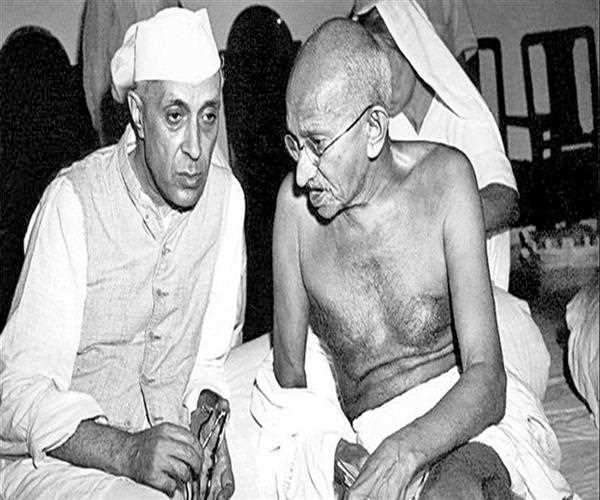
29-Jun-2022 , Updated on 6/29/2022 12:05:44 PM
Why did Gandhi favor Nehru so much? What were Gandhi's compulsions when there we
Indian history glorifies its leaders as much as its attainment of freedom, but the big question that hangs upon the head is, are these leaders worth the celebration? As the struggling years transformed and evolved the nation, so did the relationship between these two. The two participated in changing the struggle for Independence and also created the blueprint for India's social transformation along modern lines.
As we all know, Nehru's political career started with his self-proclamation as a Gandhi follower. Gandhi spellbound him after he met him in 1916. One of the programs of non-cooperation with the British Government appealed to Nehru, and he jumped at it. Without giving it, one thought he merged his lot with Gandhi. Nehru wanted Congress to declare complete favor towards complete Independence instead of a mere 'Swaraj' or self-rule. His visit to the USSR and Europe in 1927 radicalized Nehru's politics as he was impatient with the slow pace of the national movement. Nehru's modern outlook advocated fusing India's struggle against British imperialism with the global struggle against imperialism and colonialism in general. However, this seemed to be a massive jump for an unstable nation in 1927. Nehru was finally able to convince Congress in favor of Swaraj. Nehru condemned feudalism and capitalism and talked about mobilizing workers, peasants, and students.
On the other hand, Gandhi did not approve of this idea of the new ideological flavor and called the resolution for complete independence 'hastily conceived and thoughtlessly passed.' Foreign-educated Nehru was convinced that Gandhi did not want to take any lessons and learn from the west. After this, there was an exchange of letters back and forth where both the leaders condemned each other's language, perception, and ideas of politics and how their actions affected the nation. In a way, these two were completely opposite of each other and uniquely complemented each other. These letters emphasized all those points where Nehru fundamentally disagreed with Gandhi and disapproved of his ideas and vice versa. The nation, even at times, was led by confused and ununited leaders who were fighting with each other, of which the British always took advantage. This tussle ended with Gandhi's letter, where he quoted, 'Though I was beginning to detect some differences in viewpoint between you and me, I had no notion whatsoever of the terrible extent of these differences…. I see quite clearly that you must carry open warfare against me and my views. If I am wrong, I am evidently doing irreparable harm to the country, and it is your duty after having known it to rise in revolt against me…. The differences between you and me appear to be so vast and radical that there seems to be no meeting ground between us. I can't conceal from you my grief that I should lose a comrade so valiant, so faithful, so able, and so honest as you have always been, but in serving a cause, comradeships have got to be sacrificed. The cause must be held superior to all such considerations.' Further, Gandhi then advised that their correspondence, containing all the differences, should be published so that the people know where the two leaders stand vis-à-vis one another on most political issues.
Nehru, within the meanwhile, may have realized that he had overstated and overreacted their differences which it had been still possible for them to figure out together. He had written in the same letter that Gandhi was infinitely more significant than all his little books and ideas. Gandhi's importance lay primarily in his 'action and daring and courage.' The possibility of political separation that was to be declared disturbed public Nehru. Next, he wrote back expressing his grief by saying he moved, inspired him, and was grateful to him for his kindness. Thus, their first encounter ended.
After a year's time, Gandhi wanted Nehru to be the president of the Congress at its Lahore session in 1929. But, again, Nehru insisted Congress declare complete swaraj as its goal. This time Nehru's surrender created a soft spot in Gandhi's heart. Consequently, Gandhi supported him to the fullest and gave an ultimatum to the British Government. Gandhi followed it up with the Dandi March in 1930 and the initiation of the Civil Disobedience Movement.
As his friendship with Nehru deepened, Nehru transformed Gandhi's revolting views against Constitutional matters into a matter of his interest. Later, Gandhi even admitted that this change of heart was large because of his interactions with Nehru. The two leaders were not only shaping the national movement but also their own views and perspectives too.
While Nehru turned the table for Gandhi on matters related to the Constitution, the other hand, vice versa took place for Nehru in the case of his attitude towards religion. For Nehru, religion was equated with superstition, intolerance, and irrationality. He believed that religion was the cause of social problems in a country. He was conflicted within his own views where on one side, he looked at religion as 'blind belief and reaction, dogma and bigotry, superstition and exploitation and the preservation of vested interests.' but also as a moral force, 'which supplied a deep inner craving of human beings ...[and] has brought peace and comfort to innumerable tortured souls.' Gandhi's role was significant and clear in Nehru's change of perspective.
The 'soft corner' Gandhi had for Nehru had grown so much by now that he had started pampering Nehru. He had preferred Nehru over Sardar Patel a minimum of twice before 1946 for the post of Congress president. It happened in 1929 further than in 1937. The universalism, foreign education, and modern outlook had swayed Gandhi off his feet. Nehru, compared to Sardar Patel, who seemed a little orthodox, and Gandhi believed India needed an everyday person in his approach. One thing that Gandhi was sure about was that Patel would never disobey him, which was not the case with Nehru even after the deep friendship, which came true when Nehru made it clear to him that he was not willing to play second fiddle to anybody.
For all we know, Gandhi wished Nehru and Patel to lead the country. Gandhi then used his veto power in favor of Nehru as he was scared that if Nehru were not given a chance to become Prime Minister, it would cause damage to India's way to Independence. Some analysts also claimed Nehru made a threat of splitting the Congress in case he was not made Prime Minister. It is also said that Nehru forced Gandhi into supporting him by threatening him to split the Congress and the entire independence plan would be easily delayed and also giving the British an excuse by raising the question as to who should be handed over the reins of power, Congress with Nehru or Congress minus Nehru. Gandhi even said that Nehru was Power-hungry, which implies that he thought it was safer to ask Patel to sacrifice and compromise to become the Prime minister than Nehru, reflecting the dominant hand of Nehru in their relationship who twisted and turned according to his will.
The leaders back then and even today have no idea how big an impact and influence they leave on a nation, how the innocent citizens who have nothing to do with the choices and decisions made by these leaders end up hurting them.

Student
I look for a mix of short-term projects and long-term goals. My organizational skills allow me to successfully multitask and complete both kinds of projects. Working for you would give me the opportunity to build upon my experience and skills in data handling , content writing, financial researcher and analyst, and Product manager as part of a really inspiring and rewarding environment to work.
Comments
Join Our Newsletter
Subscribe to our newsletter to receive emails about new views posts, releases and updates.
Copyright 2010 - 2026 MindStick Software Pvt. Ltd. All Rights Reserved Privacy Policy | Terms & Conditions | Cookie Policy